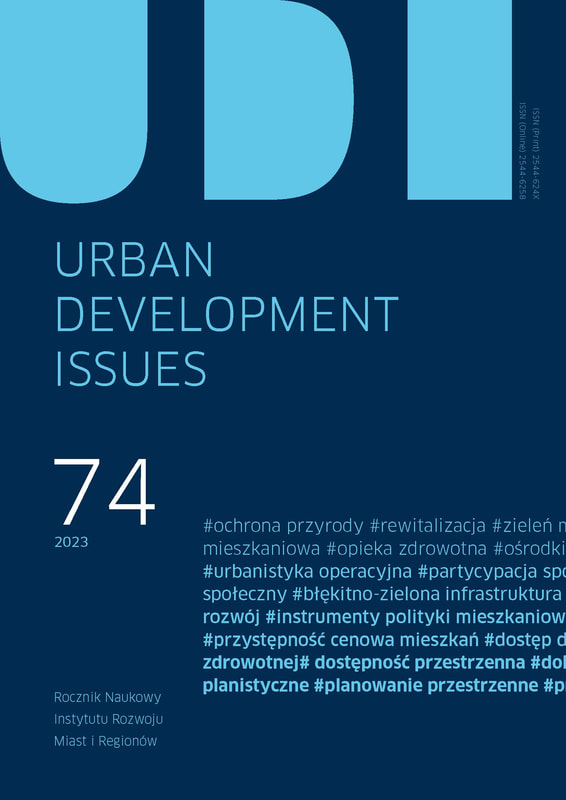|
Overview
The journal Urban Development Issues (UDI) is a scientific, open volume, yearbook (ISSN: 2544-624X print, 2544-6258 online) published by the leading Polish institution for spatial planning and urban studies, the Institute of Urban and Regional Development. Published since 2004 (fully in English between 2017 and 2020, currently in English and in Polish), the journal has changed its scope from being the strong voice of practice to making a valuable scientific contribution to contemporary urban studies. In July 2023 the journal "Urban Development Issues" received 70 points on the ministerial list of journals in Poland. Aim There are many great journals accepting papers on city-related research. How is UDI different from the others? We cherish papers devoted to the identification of urban phenomena or the analysis of the processes that shape cities, but we want them to be treated as a contribution to a more in-depth discussion of the conditions of urban development. Our aim is that every paper published in UDI should bring science closer to an understanding of urban development issues and look for effective tools to resolve them. Scope The effectiveness of spatial planning tools The description of a particular spatial plan is always very informative. From UDI’s perspective, it cannot reduce the content of a paper. We expect spatial planning papers to express clearly how they contribute to the discussion on changing paradigms in planning. Transportation and mobility Even the most innovative solutions in transportation may not be a common solution for urban development issues everywhere. We expect a much wider look from authors at the complexity of mobility and the choices that people make in this area. We encourage them to ask questions about the importance of cultural factors in choosing means of transportation. We’re waiting for comparative studies but at the same time, we expect a strong awareness of why human spatial behaviour differs globally, regionally and locally. Urban regeneration vs gentrification The presentation of different examples of regeneration projects is always interesting, selections of those that could work as good practice even more so. To publish a paper that deals with urban regeneration in UDI, authors always have to go further in looking for a greater understanding of what constitutes good practice in urban regeneration and how to make it more resilient to gentrification. We even encourage our authors to ask provocative questions: Is urban regeneration possible without gentrification? Should we treat gentrification only as a negative effect of other processes or solutions or maybe our authors could propose ways to control gentrification so that one can use the good that emanates from it? Urban sprawl and hyper-urbanisation The world of science is very aware of all the negative consequences arising from both these issues. UDI is a great place not only to present their further socio-economic outcomes but is also very open to studies devoted to the modelling of land use and population distribution changes using different planning tools. The areas of urban studies described above shouldn’t be recognised as any kind of limitation of content. We are open to publishing works from every area of urban studies. We are very proud that UDI is a place open to authors that represent different disciplines. Our strength is also our diversity of spatial scales. We encourage authors to work on selected cases. We believe that every place is worth being researched, but authors are expected to explain if a given case is being researched because its features are somehow representative of a larger group or because of its uniqueness. We want to be a journal that helps us understand the complexity of urban and urbanised space, which is an important development issue in itself. Karol Janas Editor-in-chief The project of transformation of the journal from Polish to English, its internationalization as well as preparation of its digital archive and implementation of its editorial policy concerning publication ethics has been finacially supported by the Ministry of Science and Higher Education of the Republic of Poland (grant No. 841/P-DUN/2016, project duration: 2016-2017). |
CURRENT ISSUE |
|
Address:
Institute of Urban and Regional Development (Instytut Rozwoju Miast i Regionów) ul. Targowa 45, 03-728 Warszawa Correspondence address: ul. Cieszyńska 2, 30-015 Kraków (Poland) |
e-mail: udi@irmir.pl
phone: (+48) 12 634 29 53, ext. 48 (Thu 10:00-14:00 CET) fax: (+48) 12 633 94 05 |



